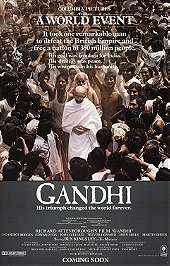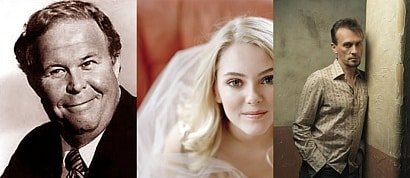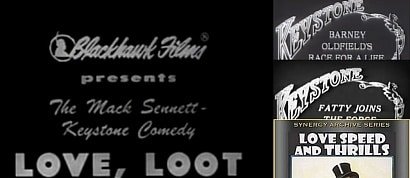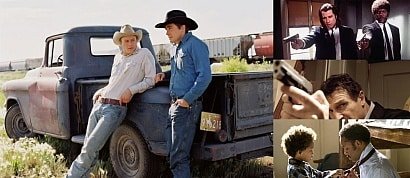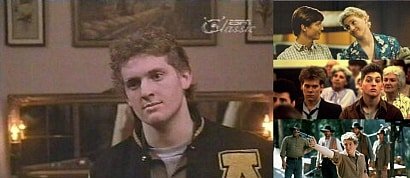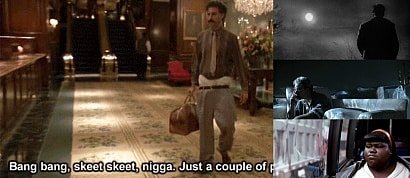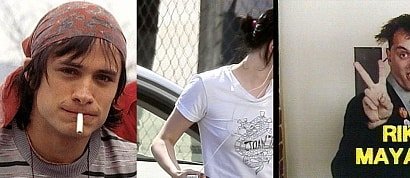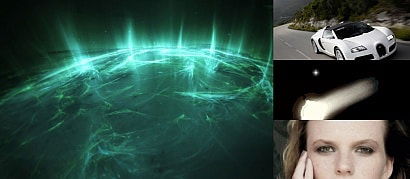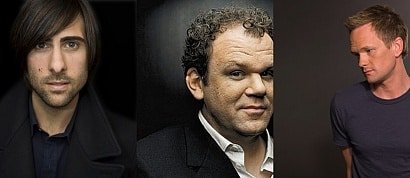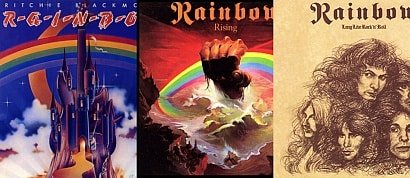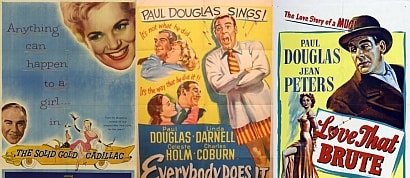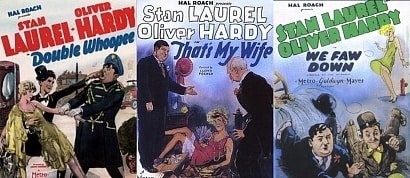For decades, Richard Attenborough's sweeping epic biographical film Gandhi has been incessantly subjected to critical acclaim and abject disparaging. The film won no less than 8 Oscars in 1983, including the holy three (Best Picture, Best Director, Best Actor) in addition to Best Cinematography, Best Film Editing and several others. On top of these exalted awards, Attenborough's biopic collected five BAFTAs (including the holy trinity of Best Film, Director and Actor) and five Golden Globes. Even after acquiring these, Gandhi garnered countless other prestigious awards. With this impressively long list of credentials, it's inevitable that critics and audiences would search for reasons to hate it. Granted, there is some to criticise. However this largely depends on what you expect.
Richard Attenborough developed the film over the course of about 20 years and was so enamoured by the man that he wanted the film to be a relentless tribute that focuses less on his weaker facets. In accepting the award for Best Picture, director Attenborough remarked that it was neither the film nor the creative team being honoured by the Academy that evening, but Mohandas K. "Mahatma" Gandhi himself. The little man with a loincloth and a walking stick made a profound impact on his home country. So profound, in fact, that the film holds the record for most amount of extras ever used in a single scene. For the scene depicting Gandhi's funeral, roughly 300,000 extras were used to fill the frame. Approximately two thirds of these extras were volunteers working for no money. They were in attendance for the filming to help Attenborough honour a man who materialised as a prominent representative of India. Attenborough's Gandhi is epic in scope and scale, and these extras further solidify Gandhi's popularity and influence. His thousands (perhaps millions) of followers were prepared to go to the end of the Earth in supporting Gandhi's cause. The people of India would ultimately acknowledge Gandhi with the title of "Mahatma" (meaning great soul) because of his revolutionary method of non-violent civil disobedience, which he initially employed as a young attorney in South Africa to challenge British laws that unjustly made Indians second-class citizens.
Gandhi is an epic creation that chronicles the life and death of Mohandas K. Gandhi: a remarkable man who refused to turn a blind eye to discrimination, yet firmly stood against violence in his methods. The man refused to resort to violence even after the tragic Amritsar massacre during which thousands of Indian men, women and young children were shot mercilessly in cold blood.
Altogether the film covers roughly 50 years of history, from Gandhi as a young Indian lawyer to an elderly man eventually assassinated by a Hindu extremist. The opening sequence depicts Gandhi's death by an assassin's bullet before telling the story through flashback. Initially we follow Gandhi as a young attorney in 1893, when the unlawful injustice and prejudice is brought to his attention when he is thrown from a train after refusing to move from the first-class seat that he booked. This young Indian man staged a revolution, breaking down the prejudice against him and his coloured followers. His successes proved an inspiration for the entire world: Gandhi was a towering little man, and a motivating figure. Amid the most tumultuous, horror-filled years of war and bloodshed in history, he taught the world an alternative, non-violent method of combating oppression.
The film's beginning is prefaced with a disclaimer:
The film truly pushes the envelope with its running time of about 3 hours. Attenborough chooses to focus on the man and the way his spirit shaped world history - not just the UK, but world history. The film is a tribute and a portrait of the man, showing his origins to his full-scale protests. We see Gandhi being imprisoned several times while his faithful supporters continued protests in his honour. We also watch in awe as Gandhi fasts...he refuses to eat until his wishes are accomplished. Attenborough imbues his film with the true spirit of Gandhi.
Ben Kingsley has been endlessly lauded and acclaimed for his unforgettable portrayal as Mahatma Gandhi. Although most audiences only know the historical Gandhi from history books and stories, Kingsley's masterful performance personifies everything we visualise about the man himself. He prepared for his role comprehensively by scrutinising newsreel footage of Gandhi, reading books on (and by) the subject, dieting, losing weight, practicing Yoga, and learning to spin thread. As a result this thorough research is very palpable. He masters the nature of the real man: humble and contrite. Better yet, Kingsley looks the part to stunning effect. His transformation from young man to frail old man is subtle yet effective. You will genuinely believe you're watching real footage of the man. Apparently Indian people believed Kingsley's performance was a reincarnation.
Kingsley is surrounded by a capable supporting cast. Many well-known actors appear throughout the film's duration. Martin Sheen appears as a reporter, and an extremely youthful Daniel Day-Lewis plays a boy who confronts Charlie in the street. There are countless other cast members that evince acting brilliance.
The amazing locations are captured with mind-blowing cinematography. Gandhi borrows techniques from celebrated epics such as Lawrence of Arabia. This exquisite photography was crucial as the entire film is essentially dialogue. The intriguing visuals are marvellous to behold. The pacing is deliberately slow and unhurried as there is much ground to cover.
However, there are criticisms to be pointed out. The politics that fuel the proceedings are confusing. Additional explication is sorely needed in this area. In tradition with most epics, the storytelling is at its best. In spite of this, the second half is marginally less riveting than the first. The running time is occasionally very irritating, but at the same time it's impossible to remove a frame. It's also worth noting that the film frequently canonises Gandhi's philosophies rather than exploring them. His preaching is therefore trivialised and occasionally distorted.
Despite its shortcomings and countless haters, Gandhi is an important film about a great man. In short, this is a film everyone must see at least once. It's an absorbing history lesson as well as deep food for the soul: it gives us inspiration and hope while illustrating the capabilities of a single man. Attenborough tells an amazingly powerful story in this film, with incredible cinematography and an extraordinary period atmosphere that makes it a memorable epic deserving to stand beside Lawrence of Arabia. Gandhi is simply unforgettable and remarkable...watch it without hesitation.
8.85/10
 Login
Login